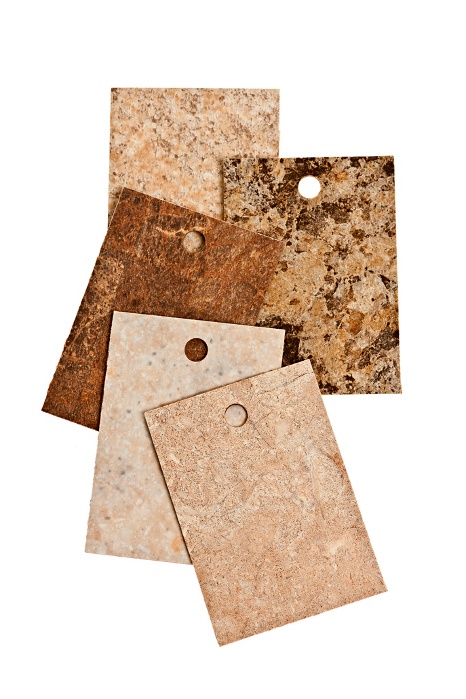Natural Stone
Natural stone is a premium countertop material, and there’s no doubt that it offers a luxurious, high-end feel that designer kitchens demand. However, there are still a few negatives associated with this type of countertop. You’ll want to consider both the advantages and disadvantages when selecting your new construction home décor.
Pros of Natural Stone:
- Beautiful natural variations – meaning no two pieces are exactly alike.
- Hard wearing and solid, they’ll easily outlive laminates, butcher block and other cheaper materials.
- Can be cut and shaped as needed to accommodate different types of edges, sinks and other elements.
- Great for activities that need a cold, solid, smooth surface, like making pastry and pasta.
- A variety of stones including granite, marble, soapstone, limestone and other types to suit a variety of looks.
Cons of Natural Stone
- No two pieces are alike. If you make a mistake or you ever need to match your countertop or change a design element, you will need to completely replace the countertop. There is no way to match most types of natural stone, particularly marbles and granites.
- This type of countertop is costly, and it must be installed by professionals. In fact, certain stone companies won’t warranty their products unless installed by a pro.
- While they are low maintenance most of the time, natural stone countertops still need to be sealed regularly. If and when they get chipped, repair can be difficult or even impossible.
Engineered Stone
Engineered stone countertops, which include quartz and similar types of material, are a newer alternative to natural stone, and they are becoming more popular all the time. For the most part, they are less expensive than natural stone, but there are other factors to consider.
Pros of Engineered Stone
- Because engineered stone countertops are manufactured, they are available in a huge range of colors and can include amazing features, like tiny glittery glass particles that literally make them sparkle.
- Because they are manufactured, as long as you buy the same color and lot, you can get often additional pieces or replacement pieces if needed.
- In most circumstances, engineered stone is much less porous than natural stone, so there’s even less maintenance required.
- They’re hard wearing and usually cheaper than natural stone.
Cons of Engineered Stone
- Interestingly, engineered stone isn’t always as easy to shape as natural stone, and if your kitchen features lots of curves and other design elements, it may be challenging.
- It’s not as unique as natural stone is, so if you’re looking for a one-of-a-kind material, this is not it.
- Because it’s tricky to work with, you still need professional installation for engineered stone, so cost savings can be insignificant.
Whichever option you choose, there’s no denying that stone countertops will be an asset to any kitchen. So weigh your options, see what’s available and choose what you love.
















Leave a Comment